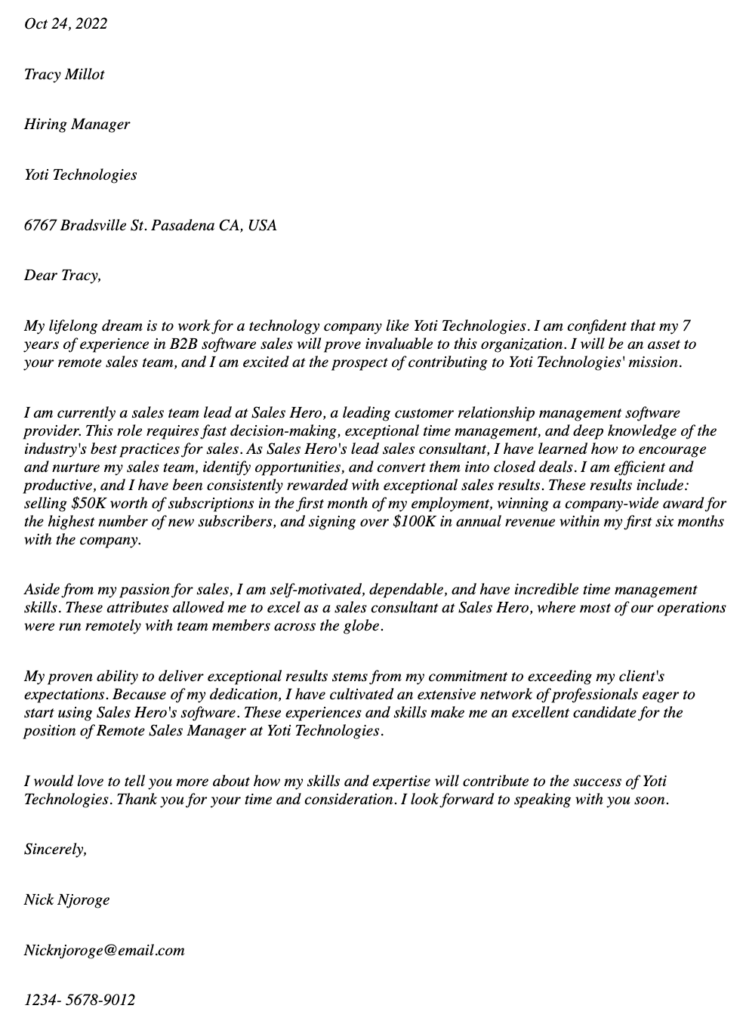The cover letter: candidates dread them – hiring managers depend on them. But are they still relevant today?
A 2022 study by ResumeLab, a service that helps job hunters write resumes and cover letters, surveyed over 200 hiring decision-makers to know if cover letters are still necessary. A whopping 83% said that a cover letter is a critical part of their selection process – ergo, the cover letter is relevant.
And as remote work continues to gather pace, a cover letter for a remote position is even more critical since, more often than not, you’d never get a chance to make a case for yourself in person.
So how do you write a cover letter for a remote job? What should you include, and what should you leave out? Here are six tips that’ll help you craft a compelling one.
How Do You Write a Cover Letter For a Remote Position?
Before writing a cover letter for a remote position, you need to know that this document is mainly about showing what you can do for the company.
With this in mind, you can better tailor it to the employer’s needs. Here´s how!
1. Do Your Research About the Company and Position
Without understanding your audience, you can’t write a compelling cover letter for a remote job. You must know what the company does, what it’s looking for, and what the hiring manager’s expectations are for the position. A job posting is the first place to look for this information. Read and understand the job ad to get a complete picture of the role.
Additionally, visit the company´s website. Look for its mission, vision, and values. Also, check for the latest news and blog posts on the company.
Above all, the message the hiring company is trying to communicate through its job posting must resonate with you. Perhaps you have wanted to work with the company for a long time, or you are in tune with their philosophy on work.
2. Introduce Yourself
This is the first paragraph of your cover letter, where you will introduce yourself and explain why you are applying for this position. Use your research about the company and role to explain how you hope to contribute to the company’s mission. Let your enthusiasm and motivation shine through this paragraph – this is what will motivate the hiring manager to read on.
Here’s an example of what your introductory paragraph may look like:
“It has been my lifelong dream to work for a technology company like [Company Name]. I am confident that my 7 years of experience in B2B software sales will prove invaluable to [Company Name]. I will be an asset to your sales team, and I am excited at the prospect of contributing to [Company Name]’s mission.”
3. Highlight Your Relevant Skills and Experience
In the second paragraph, you need to tell the recipient what expertise and skills you have that are relevant to the job opening. Explain how these skills helped your previous employers succeed in their projects. If you mention skills from the company’s job description in your cover letter, it proves that you took the time to read and understand the position requirements thoroughly before applying.
Here’s an example of a cover letter that highlights relevant skills:
“At [Previous Company], I was responsible for [performance metrics]. Before that, I worked as a [Previous Job Title] for [Previous Company]. Throughout my tenure at [Previous Company], I consistently exceeded sales quotas by [percentage increase].”
Also, in this section, you can highlight the skills that show you can work remotely. For instance, remote positions typically require the following:
Excellent communication (written or verbal)
- Organization
- Self-motivation
- Time management
- Ability to work independently
- Problem-solving
Remember that you do not need to list all your skills in the cover letter – just the ones that show that you are qualified for the position.
4. Emphasize How You’ll Add Value to the Organization
This section is where you will explain in detail how you plan to help the company succeed when they hire you. How do you plan to help them realize their mission and vision? What have you done in your previous work experiences demonstrating your potential to contribute positively to this company?
Use examples of your past successes. If you mention key milestones from your past work experiences, say how you impacted the company’s bottom line.
Here’s an example:
“At [Previous Company], I contributed significantly to [key achievement/s]. I was able to [deliver/achieve/surpass] because of this [skill/knowledge/skill-set] that I possess. “
5. Outline Your Competitive Advantage
At this stage, you want the hiring manager to know how you stand out from all the other applicants for the position. For example, if you have experience working remotely, mention that in this section. If you have worked in the same field for a long time, you can also mention that.
It is okay to mention certificates or training relevant to remote work if you do not have remote work experience. This section could also explain employment gaps or other unique work situations. Since your resume lacks context, this is your opportunity to clarify these circumstances.
6. Close with a Strong Call to Action
Always ensure to wrap up your cover letter with a bang! Give an overview of your qualification and the impact you intend to make in the remote position. Affirm your excitement about working for the company, and thank the recipient for taking the time to review your application.
Finish with a call-to-action that invites the recipient to contact you. You can ask them not to hesitate to contact you with any questions they may have regarding your application.
Here’s an example of a strong finish:
“Thank you for your time and consideration. I would love to tell you more about how my skills and expertise will contribute to the success of [company name]. I look forward to speaking with you soon.”
Cover Letter for Remote Position: The Do’s and Don’t
The Do’s
The do’s for writing a cover letter for online jobs are:
- Make it clear and concise. Write your cover letter using short sentences. Use easy-to-read fonts in 11 or 12-point sizes. Your document should be well-formatted and not be more than 3-5 paragraphs on one page.
- Use job-specific keywords. Make sure your skills and experiences match the language in the job description. This step demonstrates your understanding of the role’s expectations and requirements.
- Address the recipient by name. Write your letter directly to the hiring manager or recruiter for this role, not ‘to whom it may concern. No matter how big the company is, always address your cover letter to a person.
- Use concrete examples: show, don’t tell. If you are applying for a remote position, mention technical projects you have worked on that require some independent work. Give the reader a sample work situation and explain how you handled it.
- Show your personality. The nature of remote work means that you cannot connect with people as easily when you are physically distant from them. This makes the cover letter your first opportunity to let your personality shine through.
- Edit, edit, edit: make sure your letter is mistake-free. Ensure you proofread your document at least twice for spelling and grammatical errors. If English is not your first language, get a friend to read it and check for spelling and grammatical mistakes.
The Dont’s
The don’ts of a cover letter for online jobs are:
- Avoid using a generic template. Every job is different. When you write your cover letter, make sure you customize it for each position. By using a template, you run the risk of sounding like every other applicant.
- Don’t copy your resume. Resumes summarize your previous jobs and responsibilities, while cover letters delve into greater detail. Give relevant examples of how your skills led to optimal results instead of listing your experiences. In your letter, use two to three examples from this list.
- Never lie about your skills. It may seem tempting to lie about your skills – especially as it is a remote job. But this is a wrong move. Lying is a red flag to hiring managers; they may not want to hire you if they find out about it.
Remote Cover Letter Example
Here’s an example of a cover letter for a remote position that you can adapt to your needs:

Write the Perfect Cover Letter for a Remote Job
If done well, a cover letter for a remote job can move you to the next stage of the job application process. Hiring managers, recruiters, and HR professionals still value this old-school method of application submission, and it is still one of the best ways to show hiring managers why you are the right candidate for the job.
You have worked on your resume, networked your way into a company, and applied for the job. But what have you done to impress the hiring manager? A well-crafted cover letter that tells your story can make all the difference.






